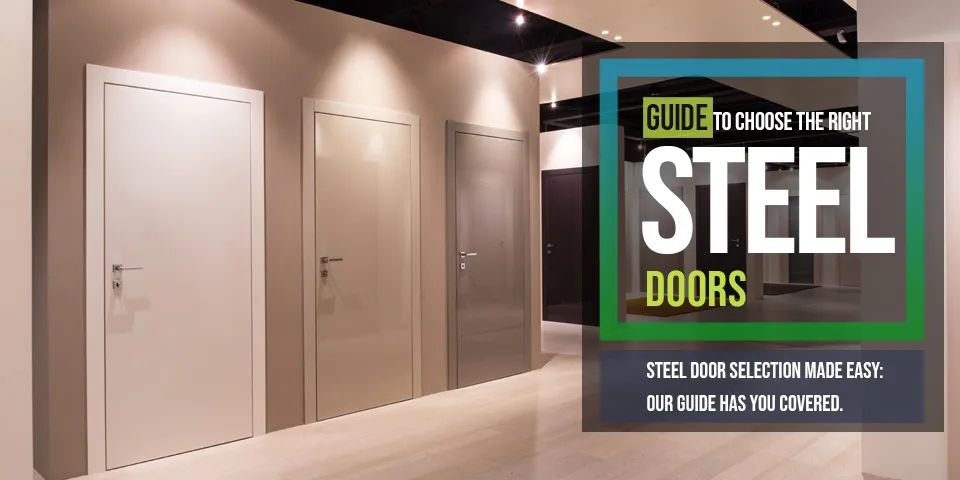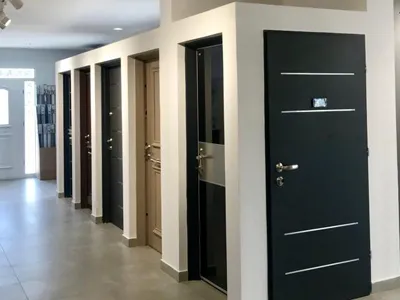The Ultimate Guide to Choose the Right Steel Doors for Your Home or Business
Steel doors are a popular choice for both residential and commercial properties, offering a perfect blend of security, durability, and aesthetics.

But with a variety of styles, features, and functionalities available, selecting the right steel door for your needs can feel overwhelming.
Selecting the right steel door for your property involves understanding your needs and priorities.
This guide will equip you with the knowledge to make an informed decision, considering factors like security level, design options, and installation requirements.

Understanding Steel Door Security Levels:
Residential Grade:
These doors offer a basic level of security and are suitable for interior applications or low-risk exterior areas like basements or garages.
Commercial Grade:
These doors are more robust than residential-grade doors and are ideal for high-traffic areas or buildings requiring enhanced security.
Heavy Duty/Security Grade:
These doors provide the highest level of security and are often used in businesses dealing with valuables or requiring maximum protection.
Property Type:
Residential: Consider flush or embossed steel doors for a modern look, or glass panel doors for a brighter entryway. Wrought iron style doors add a classic touch. Security level depends on location and risk factors.
Commercial: Steel doors with frosted or tinted glass panels are common for offices and retail spaces, balancing security with openness. High-security doors might be needed for specific areas.
Functionality:
Fire Resistance: If fire safety is a major concern (multi-unit buildings, specific businesses), choose a steel door with a fire rating.
Soundproofing: Steel doors with specific insulation can be helpful in recording studios, private meeting rooms, or shared walls.
Radiation Protection: Steel doors are specially designed to act as a barrier, protecting people and equipment from harmful radiation in environments like X-ray rooms, CT scan rooms, Research Laboratories and Nuclear power plants.
Aesthetics:
Style: Flush doors offer a clean look, embossed doors add texture, and glass panels provide openness. Consider your property's architectural style.
Finish: Steel doors come in various paint colours or wood grain finishes to match your décor.
Additional Considerations:
Door Swing Direction: Left-hand or right-hand swing depends on your space layout.
Pre-Hung vs. Slab Doors: Pre-hung doors come with the frame, simplifying installation. Slab doors require a separate frame purchase.
Hardware: Choose appropriate locks, handles, and deadbolts based on security needs and style.
It's important to note that building codes and regulations can vary depending on your location.
Always check with your local building department to determine the specific requirements for your project.
Building Codes and Fire Safety Regulations:
Fire Exits & Stairwells: Building codes often mandate steel doors for fire exits and stairwells. This ensures a clear path for evacuation during a fire and helps to contain flames and smoke.

Exit Doors in Public Buildings: Many public buildings, such as schools, hospitals, and office buildings, require steel doors for exit points due to their fire resistance and ability to withstand large numbers of people exiting quickly.

Mechanical and Electrical Rooms: To prevent unauthorized access and potential hazards, steel doors are often required for rooms housing mechanical and electrical equipment.

Server Rooms and Data Centers: Steel doors with high security features can be mandated in server rooms and data centers to protect sensitive equipment and information.

Here are some additional tips for selecting steel doors based on your property:
Consult a professional: A contractor, architect, or door specialist can advise you on the best door type considering your property's needs and local regulations.
Consider future needs: If you plan to run a business from your home in the future, a higher security door might be wise.
Think about curb appeal: The door is the first impression for your property, so choose a style that complements your overall design.
Finding the Right Supplier & Installation Process:
1. Define Your Needs:
Door Type and Features: Decide on the type of steel door you need (residential, commercial, etc.) and any desired features like fire resistance, glass panels, or automation options.
Project Scope: Determine if you need a single door or multiple doors installed. Consider any additional services required, like door removal or frame installation.
Budget: Establish a realistic budget for the project, including the cost of the doors, installation labor, and any additional materials or services needed.
2. Research Potential Suppliers:
Local Listings: Search online directories or local business listings for steel door suppliers and installers in your area.
Experience and Expertise: Look for suppliers with experience in installing steel doors, particularly for complex projects or doors with specific features.
Licensing and Insurance: Ensure the supplier has the proper licenses and insurance to operate in your area.
Ask Questions: Don't hesitate to ask questions about their experience, installation process, warranty terms, and timeline for completion.
Conclusion: Making the Best Decision for Your Business
Compare Quotes: Carefully compare quotes from different suppliers considering not just price but also experience, service offerings, and overall value proposition.
Choose the Right Fit: Select the supplier that best meets your needs, budget, and provides you with the most confidence in their ability to deliver a high-quality installation.
For more information, please don't hesitate to contact us +91 8939839157.

